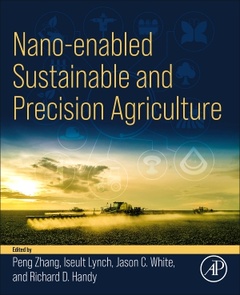Nano-enabled Sustainable and Precision Agriculture
Coordonnateurs : Zhang Peng, Lynch Iseult, White J.C., Handy Richard D.

The book addresses all these aspects by including sections on enhanced sustainability, reduced pollution and enhanced ecosystems' health, and the role of nanoinformatics and machine learning.
Section 2. Nanotechnology application in agriculture
Section 3. Interaction of nanomaterials with soil-plant system and implications for nano-enabled agriculture
Iseult Lynch holds a PhD in Chemistry from University College Dublin, Ireland. She is Chair (Professor) of Environmental Nanosciences at the School of Geography, Earth and Environmental Sciences, University of Birmingham (UoB). She was recently awarded the 2020 John Jeyes prize for Environmental Sciences from the Royal Society of Chemistry for her research into the impacts of the acquired ecological corona on nanomaterials ecotoxicity. Her research interests span human and environmental impacts of engineered and anthropogenic nanoscale materials including development of predictive models and environmental applications of nanomaterials, with a focus on nanomaterials interactions with secreted biomolecules and the implications of this for the nanomaterials themselves and ecosystems. She is interested in the development of in silico approaches for predicting nanomaterials interactions and impacts.
Jason C. White is Director of the Connecticut Agricultural Experiment Station, the oldest Agricultural Experiment Station in the country. He is Managing Editor for the Internation
- Provides foundational insights and resources for each area, including soil science, water chemistry, nanoscience, plant science, microbiology and nanoinformatics
- Focuses on mechanisms of action, transformations and the underpinning chemistry and biochemistry
- Includes linkages and cross-referencing between chapters to ensure a cohesive and comprehensive resource
Date de parution : 08-2023
Ouvrage de 582 p.
19x23.4 cm
Thèmes de Nano-enabled Sustainable and Precision Agriculture :
Mots-clés :
?Aeroponics; Agglomeration; Agricultural soils; Agriculture; Animal health; Animal production; Aquaculture; Aquafeeds; Artificial intelligence; Bioaccumulation; Biofertilization; Biomagnification; Biosensors; Carbon-based nanoparticles; Chelation; Contamination; Controlled release system; Crop; Crop quality; Cultivar; Cytotoxicity; Disease control; Dissolution; Earthworm species; Ecosystems; Engineered nanomaterials; Environment; Environmental stress; Extracellular vesicles; Fertilizer; Fish health; Fishery; Foliar spray; Food; Food chain; Food safety; Food security; Food supply; Formulation strategies; Fusarium wilt; Gene expression; Genetic modification; Green Rvolution; Green synthesis; Health; Heavy metals; Hydroponics; Imaging techniques; Life cycle assessment; Livestock production; Mechanisms; Mesoporous silica; Metal-based nanoparticles; Microbes; Microorganisms; Mode of action; Nano-biotechnology; Nano-enabled agriculture; Nanobionics; Nanodrug delivery system; Nanofertilizer; Nanoinformatics; Nanomaterial; Nanomaterials; Nanoparticle; Nanoparticle translocation; Nanoparticles; Nanopesticides; Nanotechnology; Nanovaccine; Nano–bio interactions; Nitrogen; Normalized difference vegetation index; Nutrients; Organic contaminants; Petroleum hydrocarbons; Phosphorus; Photosynthesis; Plant; Plant gene expression; Plant innate immunity; Polycyclic aromatic hydrocarbons; Potassium; Precision agriculture; Probiotic microbes; Production; Productivity; Quantification; Reactive oxygen species; Remote sensing; Rhizosheath; Rhizosphere; Rhizosphere chemistry; Risk assessment; Shellfish; Smart packaging; Soil; Soil health; Soil–plant system; Surface reactivity



